Chapter 7: Marriages and Civil Partnerships
"The number of marriages taking place in Scotland has decreased by around one third in the last 50 years”
Marriages and COVID-19
The analyses in this chapter are largely based on data up to 2019. However, in 2020 we expect the number of marriages to drop dramatically due to restictions resulting from the COVID-19 crisis.
How has the number of marriages changed over time?
There were 26,007 marriages in Scotland in 2019, 1,518 (6%) fewer than in 2018. Of these, 912 were same sex marriages involving 347 male couples and 565 female couples. This is 67 (7%) fewer same sex marriages than the previous year, continuing the decline since the peak in 2015.
Figure 7.1 shows that, following a decline from over 40,000 marriages a year in the early 1970s, the annual total levelled out at around 30,000 in the mid-1990s. The highest total recorded in recent years was 32,154 in 2004 (the highest total since 1993), whilst the highest ever recorded was 53,522 in 1940. The 2019 figure (26,007) is the lowest figure since 1881 and 6% below the recent low of 27,524 in 2009. The lowest ever recorded was 19,655 in 1858.
Since the Marriage and Civil Partnership (Scotland) Act 2014 was passed, there have been 5,909 same sex marriages in Scotland, including 1,737 civil partnerships which were changed to marriages. The peak was in 2015 when there were 1,671 same sex marriages, followed by a drop off to 998 in 2016 and a slow decline year on year since then.
Figure 7.1: Marriages, Scotland, 1971-2019
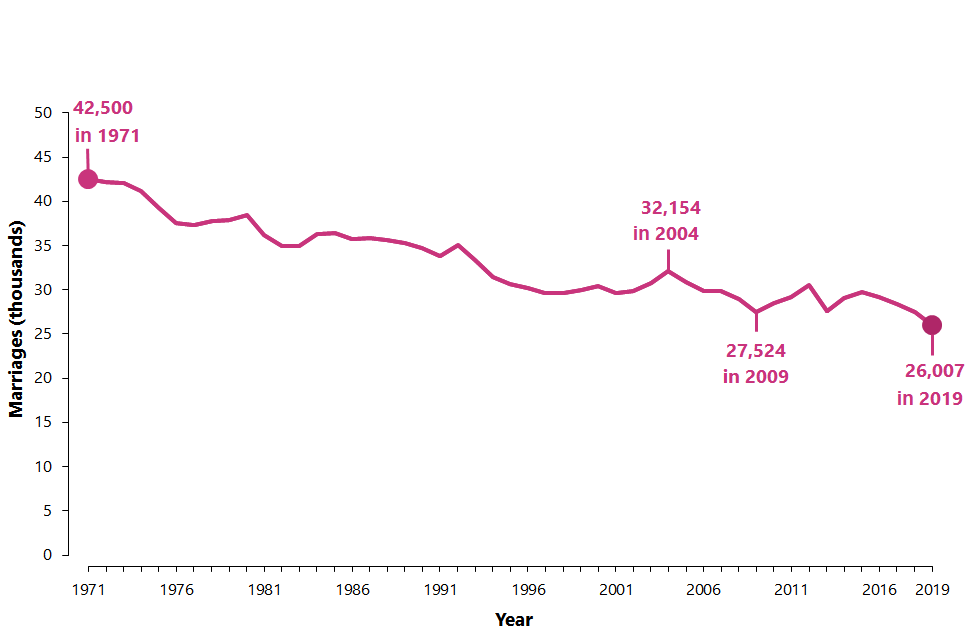
The information in this section covers all marriages registered in Scotland, regardless of where the couple lived. In 2019, there were 6,027 ‘tourism’ marriages (23% of all marriages) where neither partner was resident in Scotland. This represents a slight rise in number from 5,907 (21% of all marriages) in 2018.
Marriages at Gretna
13% of all marriages in Scotland in 2019 were registered at Gretna.
Nearly half (2,927) of ‘tourism’ marriages (where neither partner was resident in Scotland) in 2019 took place in Gretna.
As marriage was outlawed in England without paternal consent before the age of 21, some young couples chose to elope to Scotland, where they could still marry at 16 years of age. Gretna was located on an old coaching route between London and Edinburgh, and was the first village reached on entering Scotland, so became a common place for English couples to marry.
Figure 7.2 shows the number of marriages at Gretna, by the country of residence of couple getting married, between 1974 and 2019.
Figure 7.2: Marriages at Gretna, by country of residence of parties, 1974-2019
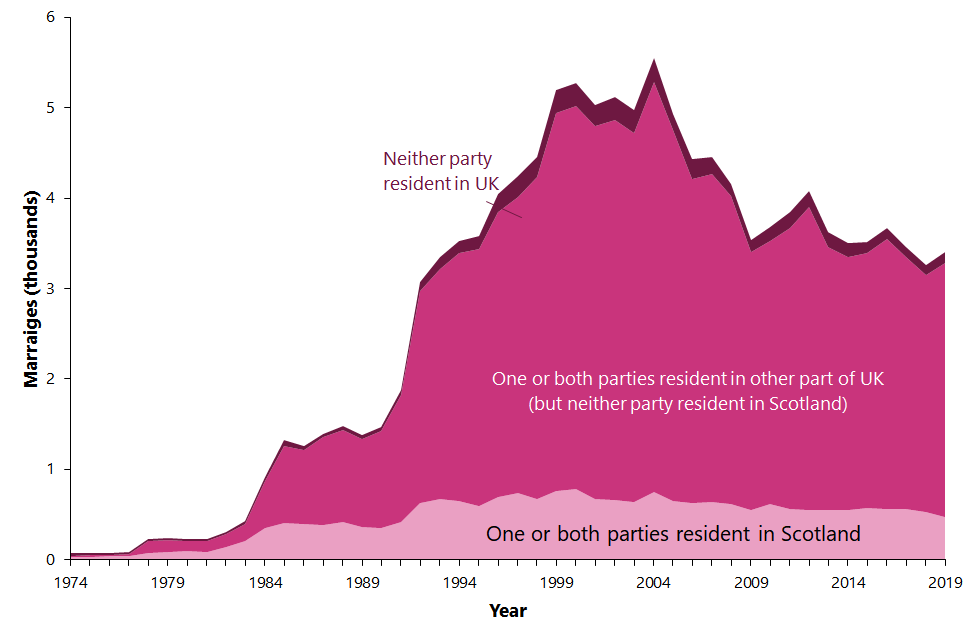
Gretna continues to be a popular venue for marriages and the 3,401 registered in 2019 (13% of all marriages in Scotland in 2019) was 5% higher than the 3,232 registered in 2018. However, the 2018 figure was the lowest number of marriages in Gretna since 1992 and was 42% lower than the record total of 5,555 in 2004 (17% of all marriages in Scotland in 2004). Over the longer term, the number of marriages at Gretna increased from only 79 in 1974 to a peak of 5,555 in 2004. In 2019, 86% (2,927) of the marriages at Gretna did not involve a resident of Scotland. For the vast majority of these marriages, both of the parties were resident in another part of the UK.
Of course, many couples who live in Scotland go abroad to be married. These marriages are not included, and only some come to the attention of the Registrar General through notification to British consular authorities.
How is the average age at marriage changing?
The average age at marriage has risen for both males and females. For first marriages, the average age of males has risen from 24.3 in the mid-1970s to 34.5 in 2019; the comparable figures for females are 22.4 in the mid-1970s and 32.9 in 2019.
Figure 7.3: Age at first marriage, 1975-2019
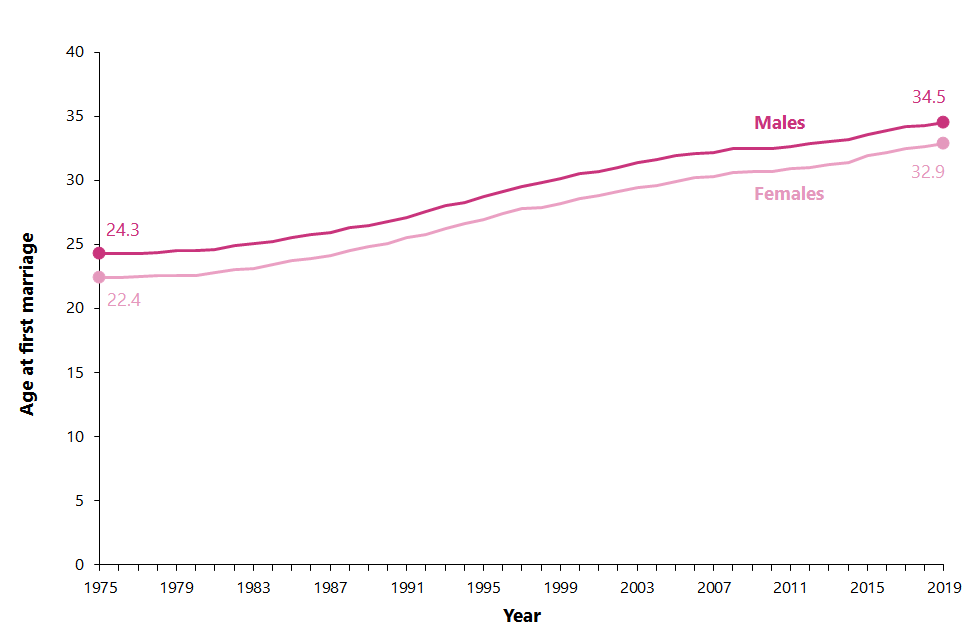
Marriages by type of ceremony
Of all marriages conducted in Scotland in 2019, almost half were civil ceremonies compared to 35% in 1975.
The number of marriages conducted by the Church of Scotland and the Roman Catholic Church have declined over time. These now represent 9% and 4% of all marriages in 2019 respectively.
Since 2005 the number of humanist marriages has increased considerably with a range of organisations conducting humanist ceremonies. These now account for 23% of all marriages in 2019.
How are marriage statistics used?
These statistics are used by a wide range of users. For example, they help inform Scottish Government policy on marriage and civil partnership. They are also used by religious and other belief organisations to monitor trends and plan their services.
Figure 7.4: Marriages, by type of ceremony, 1971-2019
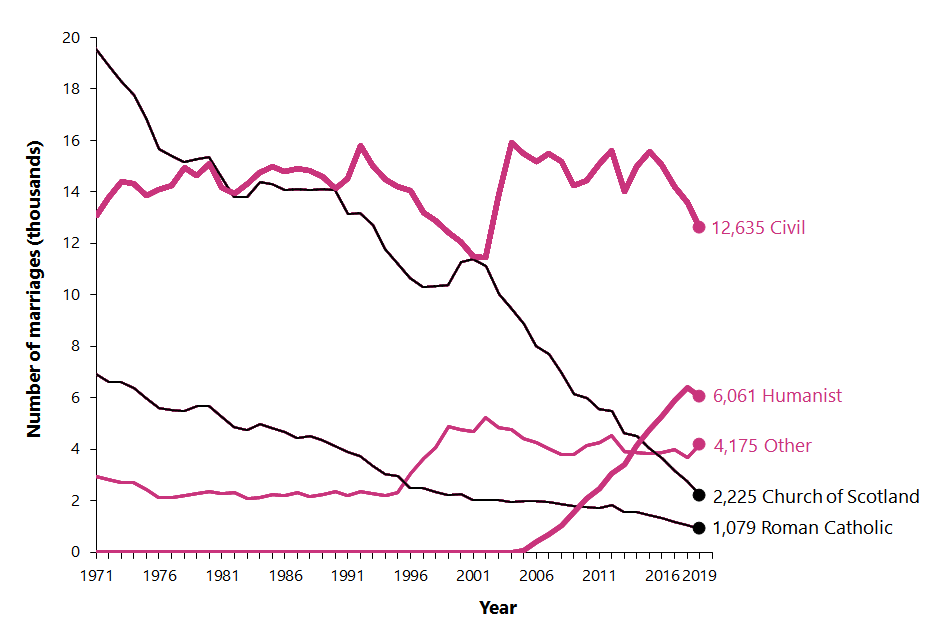
Civil partnerships
There were 83 civil partnerships registered in Scotland in 2019, 18 more than in 2018. The Civil Partnership Act 2004, which applies throughout the UK and came into force on 5 December 2005, allows same-sex couples to register their partnership.
Since the Marriage and Civil Partnership (Scotland) Act 2014 was passed, the number of civil partnerships in Scotland has remained at a low level compared to the numbers previously recorded.
Figure 7.5: Civil partnerships, 2005-2019
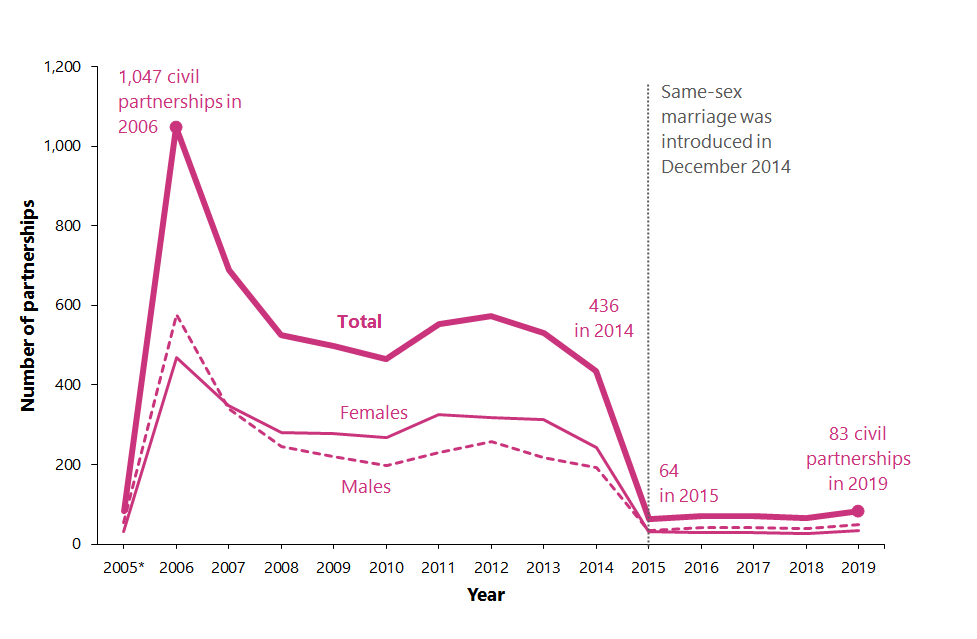
* The Civil Partnership Act came into force on 5 December 2005.
At the time of publication, work is underway on planning future developments in the registration service, including plans to implement mixed-sex civil partnerships over the coming year. More information on the registration service can be found in Chapter 10 – Statutory Registration.
More detailed information can be found in the Vital Events – Marriages and Civil Partnerships section or in the Marriages and civil partnership section of the Vital Events Reference Tables on the National Records of Scotland website.
Statistics of divorces and dissolutions for Scotland are published by the Scottish Government (section 2.2.3).